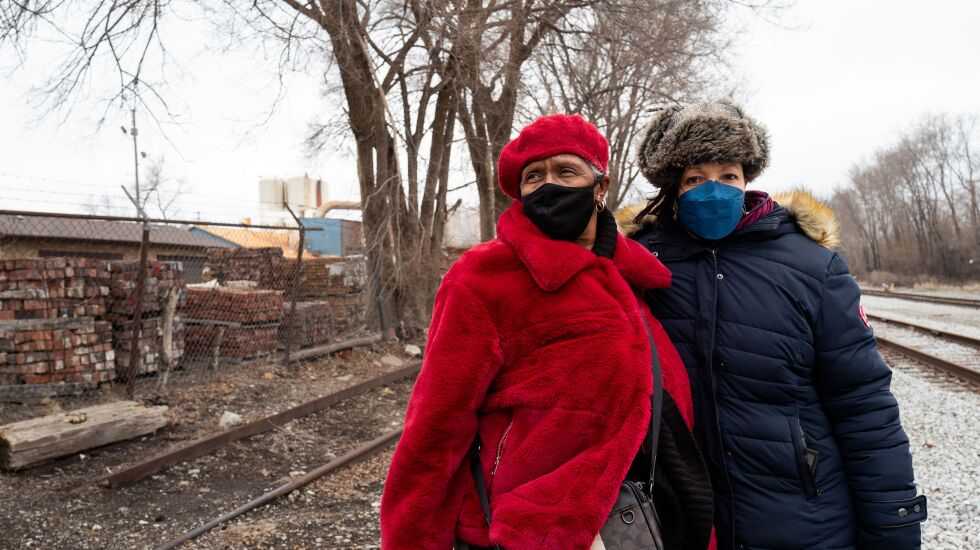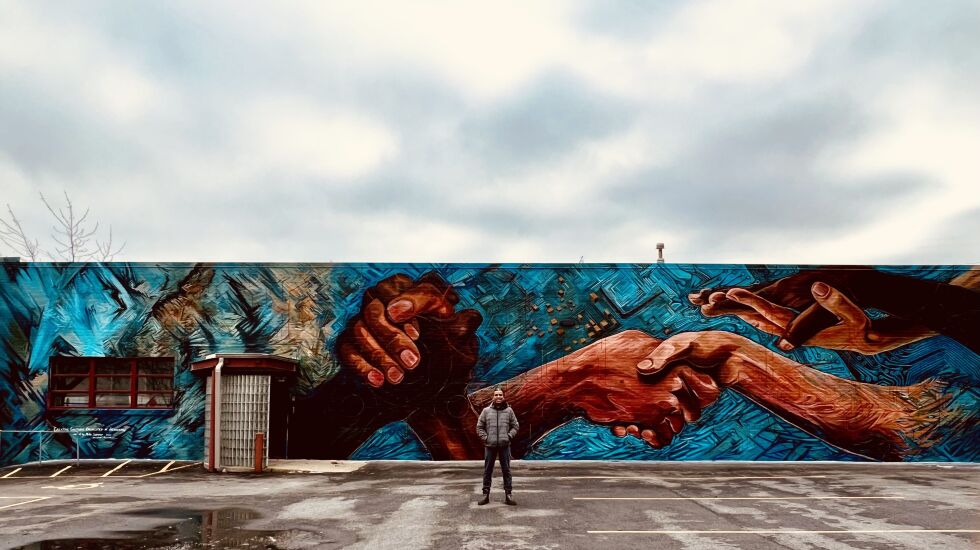
Good afternoon. Here’s the latest news you need to know in Chicago. It’s about a five-minute read that will brief you on today’s biggest stories.
— Matt Moore (@MattKenMoore)
This afternoon will be sunny with a high near 37 degrees. Tonight will be clear with a low near 24. Tomorrow will be sunny with a high near 43. Sunday will be sunny with a high near 46.
Top story
Polluters like Southeast Side plant often get a pass on air-quality violations in Chicago
Chicago businesses cited by city inspectors for air pollution sometimes spend a year or longer going through City Hall’s administrative process, in the end seeing the air pollution citations dropped and the fines reduced, records examined by the Chicago Sun-Times show.
In some cases, the businesses end up also being given a pass on additional tickets for new violations as they negotiate with Chicago officials.
Among the companies in recent years to successfully get the city to drop air pollution citations include scrap-metal operations Sims Metal Management in Pilsen, General Iron, which operated for decades in Lincoln Park, and Reliable Asphalt in Austin.
MAT Asphalt in McKinley Park fought air pollution charges in city administrative hearings, lost its case and is now appealing in state court.
From 2018 through 2022, there were 69 air pollution citations issued by the city’s public health department. Of that number, 39 were dropped, and 29 were found to be “liable,” mostly after pleas of admission from the businesses. One case, another ticket for MAT, is pending.
A number of the businesses cited are in low-income communities of color and near other industrial operations. These plants historically have operated in the same parts of the city. Mayor Lori Lightfoot has said she’ll address pollution plaguing these neighborhoods.
The Sun-Times’ examination focused on the city’s primary air pollution law, which previously carried a fine of up to $5,000 for each violation. In January 2021, the Chicago City Council substantially increased the potential penalties, doubling the maximum for a first offense and allowing for fines up to $20,000 for subsequent violations. If City Hall finds the violation particularly egregious, the fine could be as high as $50,000.
Asked about the data, city health officials say that, even though tickets for multiple violations are often given to businesses, those accusations sometimes overlap. They say that’s why City Hall sometimes agrees to let a business admit responsibility for a nuisance violation and drop air pollution citations.
City inspectors often are called out to sites for businesses that already have unresolved tickets. While inspectors flag new problems, they also have noted in dozens of instances in recent years that “enforcement action is already pending for these issues,” records show. An inspector’s concerns don’t always result in a ticket.
One of the worst environmental debacles of the past five years, the implosion of the Crawford coal plant in Little Village, resulted in no citations for air pollution. Instead, developer Hilco and two contractors paid a combined $68,000 and admitted no wrongdoing in a settlement with the city. Hilco officials didn’t respond to a request for comment. The botched Hilco implosion was the impetus for the tougher air pollution fines the Chicago City Council approved in 2021.
City officials cited Hilco and the contractors for violations including improper handling of materials, construction site cleanliness and nuisance but not air pollution even though the implosion smothered much of Little Village in dust.
Brett Chase has more in his Watchdogs report here.
More news you need
- Hours after a man was fatally shot by two Chicago cops near an Irving Park bar earlier this week, the city’s top cop told reporters that the man was killed during “an apparent exchange of gunfire.” But yesterday, the city agency charged with investigating allegations of serious police misconduct cast doubt on the key claim that the 21-year-old died in a gunfight with officers. Tom Schuba has more on the Civilian Office of Police Accountability’s investigation here.
- Chicago police might have stopped a dayslong “violent rampage” by a crew of armed robbers that included the shooting of Dakotah Earley if officers weren’t hampered by the department’s pursuit policy, according to a federal lawsuit filed by Earley. An hour before Earley was shot three times during an armed robbery in Lincoln Park in May, police had called off the pursuit of a stolen BMW linked to the man charged in Earley’s shooting, Earley’s attorney said yesterday. Andy Grimm has more on the lawsuit here.
- Hundreds came together last night for a vigil in Mount Prospect to lift up the victims of a catastrophic earthquake that slammed Turkey and Syria, resulting in the deaths of more than 22,000 people. Many gathered at the Turkish American Society of Chicago yesterday were mourning the loss of friends and family members to the tragedy. Emmanuel Camarillo has more on the vigil and how to help here.
- R. Kelly’s defense attorney asked a federal judge this morning to hand the twice-convicted R&B star a sentence that would not add to the decades he is already expected to serve behind bars. Kelly is set to be sentenced in Chicago on Feb. 23. The big question is whether the judge adds to the 30-year sentence Kelly is already serving for his racketeering conviction in New York.
- One year since Ald. Patrick Daley Thompson (11th) was convicted of cheating on his income taxes in a case involving clout-heavy Washington Federal Bank for Savings, another trial is about to get underway. It’s a trial that holds the promise of revealing more secrets about the Bridgeport bank, our Jon Seidel and Tim Novak explain in their latest Watchdogs report.
- A majority of Chicago voters think local government should provide more assistance to the hundreds of recently arrived immigrants bused here by Texas Gov. Greg Abbott, according to a new Sun-Times/WBEZ/Telemundo Chicago/NBC5 poll. Elvia Malagón breaks down the poll’s findings here.
- As part of the same poll, Chicago voters weighed in on the Bears as the team considers leaving Soldier Field for the northwest suburbs. More than half of the Chicagoans surveyed said they don’t want to see the team go — while just as many said they don’t want their tax dollars to fund Soldier Field renovations. Mitchell Armentrout has more on where Chicagoans stand here.
- Chicago and Atlanta are the front-runners for the 2024 Democratic National Convention, with Houston officially out and New York’s chances fading, sources told the Sun-Times. Chicago backers are increasingly focused on disqualifying Georgia because it is a right-to-work state with few union hotel rooms. The decision is up to President Joe Biden, who is expected to seek a second term.
A bright one
Pablo Serrano wants you to get closer to this West Loop mural
What’s a mural made of? Paint obviously. But Pablo Serrano wants people viewing his “Creative Cultural Chemistry of Democracy” mural to get up close to his sprawling work at Ashland Avenue and Hubbard Street in the West Loop so they can see there’s more to it than that.
When they do, the fine lines come into sharper view. You can see how they connect and form hexagons and circles. Those, Serrano says, are meant to represent the atoms that make up . . . everything.
“It’s very beautiful to see those structures and the geometry and just the elegance in that simplistic notion,” says Serrano, 43, a lifelong Chicagoan who painted the mural in December.

The artist says he took inspiration from the neighborhood’s industrial past. PortionPac, a chemical company, previously occupied the now-vacant building on which he painted the mural at the request of the property manager, who wanted him to “offer something unique.”
“I wanted to connect to that history of industry and development and use that as a metaphor for democracy,” Serrano says.
The main features of the mural, which covers a 100-foot-wide span, are three sets of hands. Each, Serrano says, is meant to represent a different type of human interaction. At left, two hands grip each other in an “expression of collective power and an embrace of solidarity,” Serrano says. In the center: a handshake, for a welcome greeting. The last pair of hands come together softly in a loving gesture, Serrano says.
“I view them as more romantic,” he says. “Of how it is that we share love across different cultural perspectives that we have in the city.”
Katie Anthony has the full story behind the mural here.
Want more public art stories? Check out our other newsletters and sign up for Murals & Mosaics — sent every Friday to your inbox.
From the press box
- Patrick Kane hasn’t officially requested a trade away from the Blackhawks yet, but his less-than-enthusiastic response to the Rangers’ addition of Vladimir Tarasenko indicates he might be leaning that direction, Ben Pope writes.
- When the Bears revamped their front office last year, they hired people who had experience working for the Chiefs and Eagles. With those two teams now in the Super Bowl, it appears the Bears took from the best, Patrick Finley writes.
- Previewing the weekend’s top high school basketball games: Simeon vs. Kenwood, Glenbrook North vs. New Trier and more.
Your daily question☕
What do you think this year’s Super Bowl will be remembered for?
Send us an email at newsletters@suntimes.com and we might feature your answer in the next Afternoon Edition.
Yesterday we asked you: What do you think of AMC’s choice to charge more for the best seats in the theater?
Here’s what some of you said...
“They are proving the best seats are at home on the couch!” — Cm Hannan
“Great idea. Concerts do it. Broadway does it. Airlines do it. Don’t see a problem.” — Sandy Durst
“I don’t like this idea, it’s not a concert. This will be difficult especially for us seniors. This will mark the end of movie theaters.” — Juanita Cruz
“I’m curious about what theaters will do when higher price seats are vacant and people ‘upgrade’ from an economy seat to a better one.” — Julie MacCarthy
“‘First come, first served’ on the best seats is what encourages people to be seated on time before the show starts. I hate when people get seated after the show begins and disturb everyone else.” — Judith Rapier
“Understood. With so many options for viewing, it takes work and creativity to get people into theaters. I’ll pay. When theaters are gone — and they are going — we’ll all lament it.” — Bob Long Jr.
“Their prices were already high, and they are effectively a monopoly in the cineplex realm. I will choose smaller and more local venues going forward.” — Nick Murphy
“What I think is that it is sounding too much like Ticketmaster which everyone I know hates at this point, after the Taylor Swift debacle. Next thing we know the Bots will be taking over the selling of tickets, and the bots will either be owned by the movie theater or Ticketmaster. Either way the customer will not win. I will be looking for another city in which to see movies. Preferably not in the USA. Movies will be a vacation-away-from-Chicago thing to do. Otherwise, it is back to streaming at home.” — Linda Weide
Thanks for reading the Chicago Sun-Times Afternoon Edition. Got a story you think we missed? Email us here.







